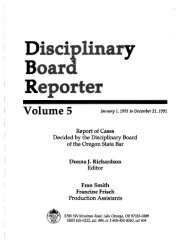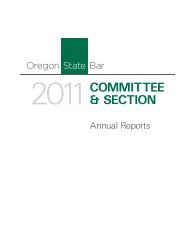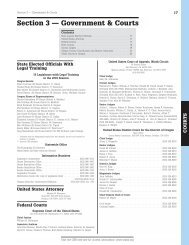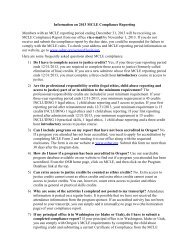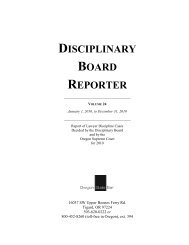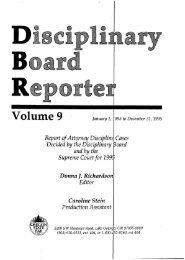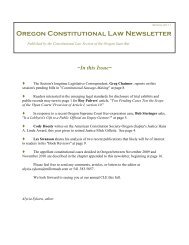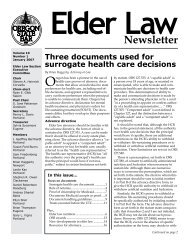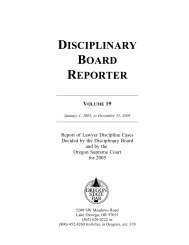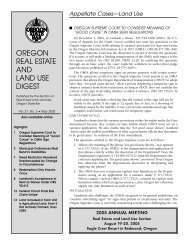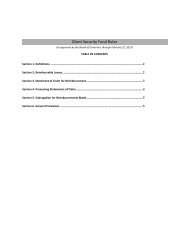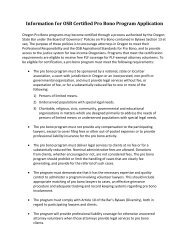February 22, 2013 - Oregon State Bar
February 22, 2013 - Oregon State Bar
February 22, 2013 - Oregon State Bar
Create successful ePaper yourself
Turn your PDF publications into a flip-book with our unique Google optimized e-Paper software.
employment unless it is apparent from the context<br />
that it is an advertisement.<br />
(c) An unsolicited communication about a lawyer<br />
or the lawyer's firm in which services are being<br />
offered must clearly identify the name, [and post<br />
office box or street address of ] city and state in<br />
which the office of the lawyer or law firm whose<br />
services are being offered is located.<br />
[(d) A lawyer may pay others for disseminating or<br />
assisting in the dissemination of communications<br />
about the lawyer or the lawyer's firm only to the<br />
extent permitted by Rule 7.2.<br />
(e) A lawyer may not engage in joint or group<br />
advertising involving more than one lawyer or law<br />
firm unless the advertising complies with Rules 7.1,<br />
7.2, and 7.3 as to all involved lawyers or law firms.<br />
Notwithstanding this rule, a bona fide lawyer referral<br />
service need not identify the names and addresses of<br />
participating lawyers.]<br />
RULE 7.2 [ADVERTISING] RESERVED ]<br />
[(a) A lawyer may pay the cost of advertisements<br />
permitted by these rules and may hire employees or<br />
independent contractors to assist as consultants or<br />
advisors in marketing a lawyer's or law firm's<br />
services. A lawyer shall not otherwise compensate or<br />
give anything of value to a person or organization to<br />
promote, recommend or secure employment by a<br />
client, or as a reward for having made a<br />
recommendation resulting in employment by a client,<br />
except as permitted by paragraph (c) or Rule 1.17.<br />
(b) A lawyer shall not request or knowingly<br />
permit a person or organization to promote,<br />
recommend or secure employment by a client through<br />
any means that involves false or misleading<br />
communications about the lawyer or the lawyer's<br />
firm. If a lawyer learns that employment by a client<br />
has resulted from false or misleading<br />
communications about the lawyer or the lawyer's<br />
firm, the lawyer shall so inform the client.<br />
(c) A lawyer or law firm may be recommended,<br />
employed or paid by, or cooperate with, a prepaid<br />
legal services plan, lawyer referral service, legal<br />
service organization or other similar plan, service or<br />
organization so long as:<br />
(1) the operation of such plan, service or<br />
organization does not result in the lawyer or the<br />
lawyer's firm violating Rule 5.4, Rule 5.5, ORS<br />
9.160, or ORS 9.500 through 9.520;<br />
(2) the recipient of legal services, and not the<br />
plan, service or organization, is recognized as<br />
the client;<br />
(3) no condition or restriction on the exercise<br />
of any participating lawyer's professional<br />
judgment on behalf of a client is imposed by the<br />
plan, service or organization; and<br />
(4) such plan, service or organization does<br />
not make communications that would violate<br />
Rule 7.3 if engaged in by the lawyer.]<br />
RULE 7.3 [DIRECT CONTACT WITH<br />
PROSPECTIVE CLIENTS] RESERVED]<br />
[(a) A lawyer shall not by in-person, live<br />
telephone or real-time electronic contact solicit<br />
professional employment from a prospective client<br />
when a significant motive for the lawyer's doing so is<br />
the lawyer's pecuniary gain, unless the person<br />
contacted:<br />
(1) is a lawyer; or<br />
(2) has a family, close personal, or prior<br />
professional relationship with the lawyer.<br />
(b) A lawyer shall not solicit professional<br />
employment from a prospective client by written,<br />
recorded or electronic communication or by inperson,<br />
telephone or real-time electronic contact<br />
even when not otherwise prohibited by paragraph<br />
(a), if:<br />
(1) the lawyer knows or reasonably should<br />
know that the physical, emotional or mental state<br />
of the prospective client is such that the person<br />
could not exercise reasonable judgment in<br />
employing a lawyer;<br />
(2) the prospective client has made known to<br />
the lawyer a desire not to be solicited by the<br />
lawyer; or<br />
(3) the solicitation involves coercion, duress<br />
or harassment.<br />
(c) Every written, recorded or electronic<br />
communication from a lawyer soliciting professional<br />
employment from a prospective client known to be in<br />
need of legal services in a particular matter shall<br />
include the words "Advertisement" in noticeable and<br />
clearly readable fashion on the outside envelope, if<br />
any, and at the beginning and ending of any recorded<br />
or electronic communication, unless the recipient of<br />
the communication is a person specified in<br />
paragraph (a).<br />
(d) Notwithstanding the prohibitions in<br />
paragraph (a), a lawyer may participate with a<br />
prepaid or group legal service plan operated by an<br />
organization not owned or directed by the lawyer<br />
that uses in-person or telephone contact to solicit<br />
memberships or subscriptions for the plan from<br />
Formatted: Font: Times New Roman<br />
Formatted: Font: Times New Roman, Italic<br />
Formatted: Font: Times New Roman, Italic<br />
Formatted: Font: Times New Roman<br />
Formatted: Font: Times New Roman<br />
Formatted: Font: Times New Roman<br />
Formatted: Font: Times New Roman, Italic<br />
Report of the Advertising Task Force - Exhibit C - Page 2 of 3



